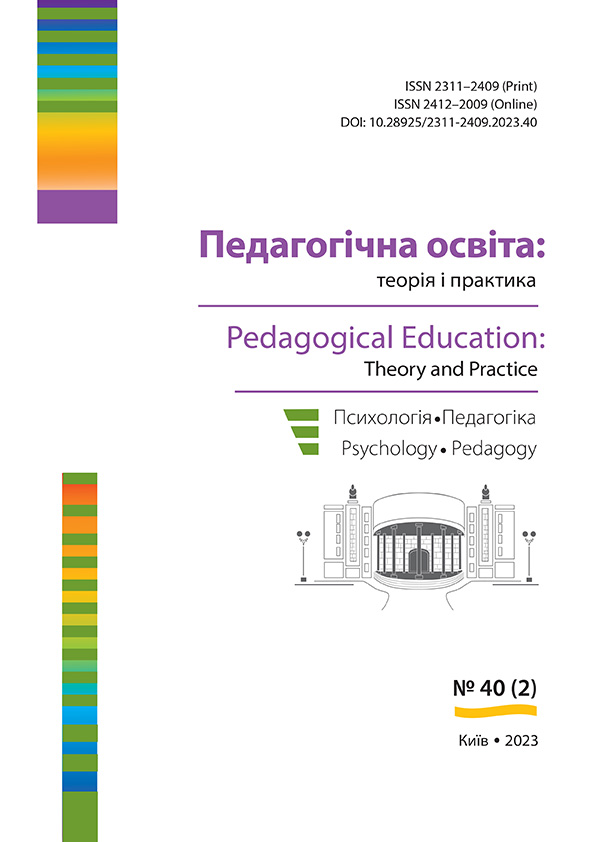Transformation of the activities of university analytical centers in the context of today's challenges.
DOI:
https://doi.org/10.28925/2311-2409.2023.402Abstract
The relevance of the article is driven by the globalization and transgressiveness of contemporary society, which stimulate the emergence of new intellectual challenges requiring prompt and high-quality responses from certain governmental institutions. The article aims to highlight the activities of domestic think tanks in the context of today's challenges, including defining the essence, types, and functions of think tanks, as well as revealing the specifics of University-affiliated think tanks. It states that think tanks are a significant component of domestic science, developing in areas such as resources and infrastructure, human potential, international cooperation, and political influence. University-affiliated think tanks are institutions dedicated to analyzing state educational policy with university support, having their mission, tasks, work structure, and implementing specific directions in scientific-analytical activities. The article provides a list of well-known domesticUniversity-affiliated think tanks and priority areas of their work related to analyzing state educational policy, socio-psychological, economic, cultural, and information policies, information security, anti-corruption efforts, etc. It is proven that in the modern period, analytics and research by think tanks are largely focused on various aspects of changes in legislation, politics, recovery, and compensation for losses during wars. Emphasis is placed on the exacerbation of problems in the development of University-affiliated think tanks, including insufficient funding, communication and collaboration complexities between analytical centers and authorities, limitations on the interaction of think tanks with business, and the insufficient number of University-affiliated think tanks. The positions of scholars regarding the resolution and minimization of outlined problems through institutionalizing the market of think tanks, strengthening cooperation, increasing transparency, developing assessment tools, and increasing the number of think tanks are presented.
Key word: think tanks, University-affiliated think tanks, types of think tanks, functions of think tanks, challenges in the development of University-affiliated think tanks.
Downloads
References
Валюх А. М., Курілов Є.А. Проблеми аналітичних центрів України та шляхи їх вирішення.
Інвестиції: практика та досвід 19, 2019. С.45-51. doi:10.32702/2306-6814.2019.19.45
Колеватова А., КоваленкоА. Проблеми розвитку наукової та інноваційної діяльності в Україні,
основні шляхи їх подолання. Науковий вісник Ужгородського національного університету. Серія:
Міжнародні економічні відносини та світове господарство 23 (1), 2019 C.130-134.
Микитюк Н. Дослідження тенденцій наукової та інноваційної діяльності в Україні. Scientific
Bulletin of Ivano-Frankivsk National Technical University of Oil and Gas (Series: Economics and Management
in the Oil and Gas Industry) 1 (23), 2021. C. 65-74. doi:10.31471/2409-0948-2021-1(23)-65-74
Про схвалення Стратегії розвитку вищої освіти в Україні на 2022-2032 роки: розпорядження
від 23 лютого 2022 р. № 286-р https://zakon.rada.gov.ua/laws/show/286-2022-%D1%80#n12
Сербін О., Ярошенко Т. Інформаційно-аналітичні центри університетів та бібліотек: виклики часу.
Український інформаційний простір 2 (10), 2022.С. 293-312. doi:10.31866/2616-7948.10.2022.270017
Шулімов С. Аналітичні центри в Україні: сучасність та можливості розвитку. Наукові перспективи 9 (15), 2021. doi:10.52058/2708-7530-2021-9(15)-251-259
McGann James G. 2020 Global Go To Think Tank Index Report, 2021.
Valiukh A. M., Kurilov Ye.A. Problemy analitychnykh tsentriv Ukrain ta shliakhy yikh vyrishennia.
Investytsii: praktyka ta dosvid 19, 2019. S.45-51. doi:10.32702/2306-6814.2019.19.45 [in Ukrainian]
Kolevatova A., Kovalenko A. Problemy rozvytku naukovoi ta innovatsiinoi diialnosti v Ukraini,
osnovni shliakhy yikh podolannia. Naukovyi visnyk Uzhhorodskoho natsionalnoho universytetu. Seriia:
Mizhnarodni ekonomichni vidnosyny ta svitove hospodarstvo 23 (1), 2019 C.130-134. [in Ukrainian]
Mykityuk N. Doslidzhennia tendentsii naukovoi ta innovatsiinoi diialnosti v Ukraini. Scientific
Bulletin of Ivano-Frankivsk National Technical University of Oil and Gas (Series: Economics and
Management in the Oil and Gas Industry) 1 (23), 2021. C. 65-74. doi:10.31471/2409-0948-2021-1(23)-65-
[in Ukrainian]
Pro skhvalennia Stratehii rozvytku vyshchoi osvity v Ukraini na 2022-2032 roky: rozporiadzhennia vid
liutoho 2022 r. No. 286-r [Посилання](https://zakon.rada.gov.ua/laws/show/286-2022-%D1%80#n12
[in Ukrainian]
Serbin O., Yaroshenko T. Informatsiino-analitychni tsentry universytetiv ta bibliotek: vyklyky chasu.
Ukrainskyi informatsiinyi prostir 2 (10), 2022. S. 293-312. doi:10.31866/2616-7948.10.2022.270017
[in Ukrainian]
Shulimov S. Analitychni tsentry v Ukraini: suchasnist ta mozhlyvosti rozvytku. Naukovi perspektyvy
(15), 2021. doi:10.52058/2708-7530-2021-9(15)-251-259 [in Ukrainian]
McGann James G. 2020 Global Go To Think Tank Index Report, 2021. [in English]

